Yahya Sinwar has told Hamas operatives to revive suicide bombings as the mastermind behind the terrorist group’s October 7 massacre leads his Palestinian militants down an even more radical path.
The 62-year-old Hamas leader is increasingly seen as a violent “megalomaniac” by the group’s senior officials. Now, according to a Wall Street Journal report, he has ordered West Bank commanders to resume suicide attacks in Israel after replacing slain leader Ismail Haniyeh.
The chilling order came shortly before a failed suicide bombing in Tel Aviv in August, the report said, citing unnamed Arab intelligence officials.
Several senior Hamas members reportedly had reservations about the decision but chose not to speak out against the practice since Sinwar took power.
In the last week alone, Hamas has claimed responsibility for two separate shooting attacks in Israel, one in Tel Aviv that killed seven people (when Iran launched a barrage of missiles at Israel) and another in Beersheba that claimed the life of a woman. Israeli soldier.
Hamas leader Yahya Sinwar has asked the terrorist group’s agents to resume suicide bombings (pictured in 2022)
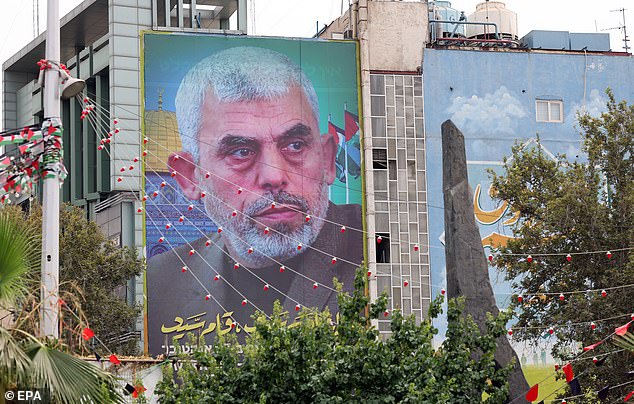
A poster of Hamas’ new leader Yahya Al-Sinwar hangs on a wall in Palestine Square in Tehran, Iran, on August 12, 2024.
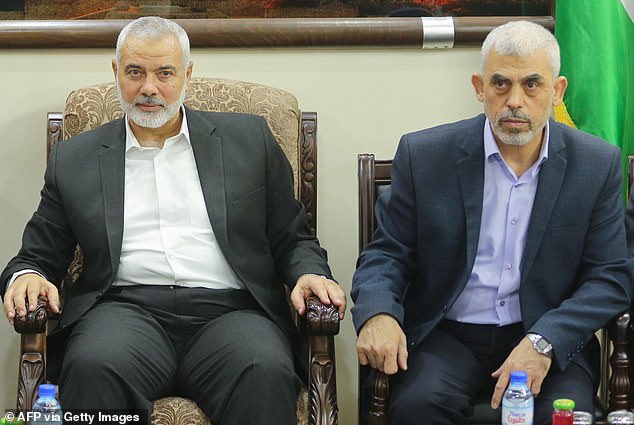
In July, the leader of Hamas’s political wing, Ismail Haniyeh, was blown up while visiting Tehran to attend the inauguration of the Iranian president. Pictured with Sinwar in 2019
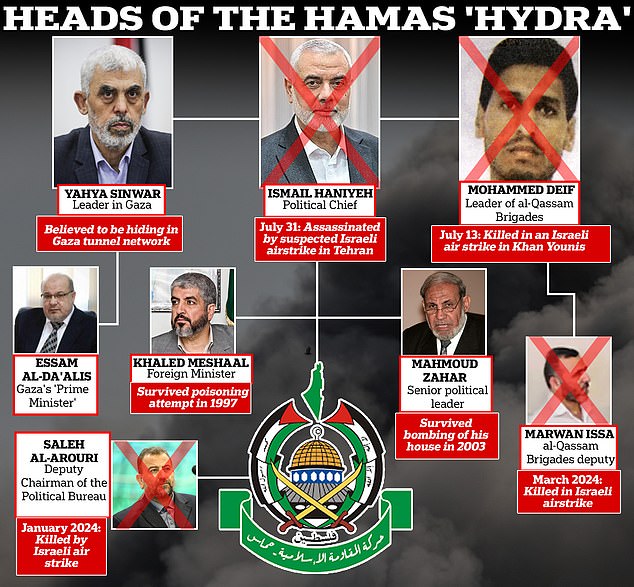
Now, Sinwar is pushing his more violent vision toward Hamas as the Israeli military moves closer to the terrorist group in Gaza amid the ongoing conflict.
Hamas officials in Doha, while publicly praising the October 7 attack, began criticizing Sinwar behind closed doors as a “megalomaniac,” according to Arab and Hamas officials cited by the WSJ.
Haniyeh and others spoke of Sinwar in “very clear terms,” Ehud Yaari, an Israeli columnist who interviewed Sinwar in prison, told the American publication.
“That he made a mistake, that he is a political fan.”
The report cited unnamed current and former Arab and Israeli officials who said Sinwar surprised even other Hamas members abroad with the timing of the Oct. 7, 2023, attack.
This led Hamas officials in Qatar to privately call Sinwar a “megalomaniac,” the report said, adding that Sinwar has recently been speaking about the current war and his own role in it in “increasingly grandiose terms.”
After Haniyeh’s assassination in July, Hamas political officials reportedly suggested former leader Khaled Mashaal as his successor.
That was before the military wing led by Sinwar, the Izz ad-Din al-Qassam Brigades, sent a message that Sinwar should be elected.
The Journal report also confirmed earlier reports that Sinwar has recently renewed contact with ceasefire and hostage deal mediators, citing unnamed Arab officials involved in the negotiations.
The outlet claimed it saw a handwritten letter by Sinwar from last month in which the terrorist chief said Hamas is ready for a protracted war of attrition to “break Israel’s will” and pave the way for the nation’s demise. .
The report said the letter cited the Quran: “And they ask, ‘When will that be?’ Say: “Maybe it’s soon.”
Shortly after Sinwar reclaimed control of Hamas, he gave the directive to relaunch suicide bombings to Zaher Jabarin, a Hamas fundraiser who recently took over responsibility for the West Bank from another Hamas leader killed in an Israeli airstrike. depending on the medium.
In his final video message, Ja’far Sa’d Saeed Muna, the Tel Aviv suicide bomber, summarized Sinwar’s zero-sum approach to fighting Israel using the slogan of Hamas’s armed wing.
In a video later released by the armed wing of Hamas, he said: ‘What a blessing it is that my bones become shrapnel that destroys the usurping Zionist Jews.
“It is Jihad, victory or martyrdom,” he added.
Hamas has carried out dozens of suicide attacks over the years.
The first was in 1989, when a bomber detonated on the 405 bus during what is known as the First Intifada, killing 16 people and wounding 17.
There was a dramatic increase in suicide bombings starting in 2001 during the Second Intifada, leaving hundreds of people dead or injured across Israel.
Before the failed attack in Tel Aviv in August, the last Hamas suicide attack was in 2016, also against a bus, and left 20 people injured.
Sinwar also reportedly revived contact with mediators in Qatar this week to explore the possibility of receiving immunity in any potential ceasefire deal for the hostages, according to Israel’s Channel 12 news.
Qatari mediators reportedly advised Sinwar to focus on the hostages, who are the main concern, rather than his current situation.
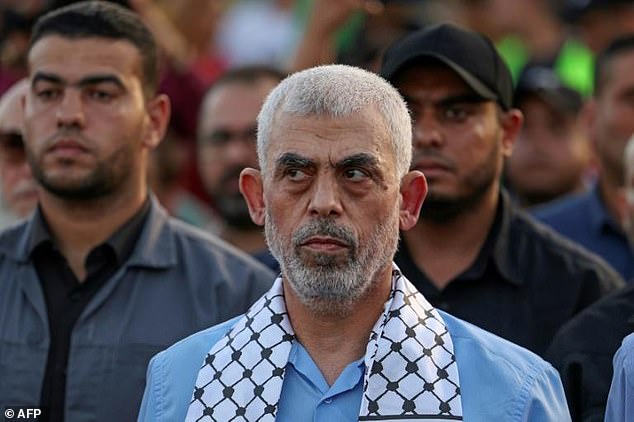
Israel accuses Sinwar (pictured) of masterminding the unprecedented October 7 attack on Israel that sparked the war.
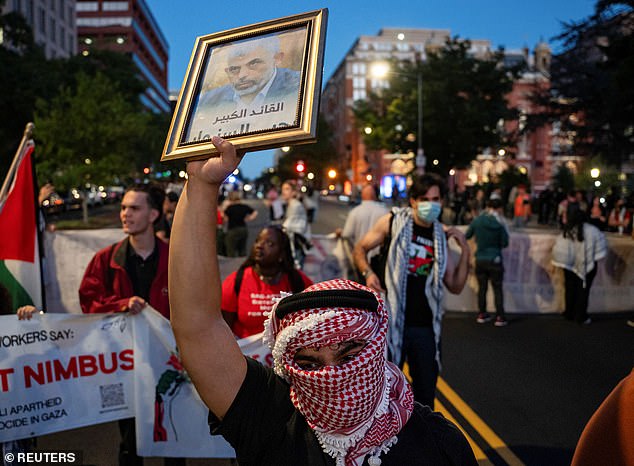
A pro-Palestinian protester holds a photograph of Hamas leader Yahya Sinwar during a march ahead of the anniversary of the October 7 attack near the White House in Washington.
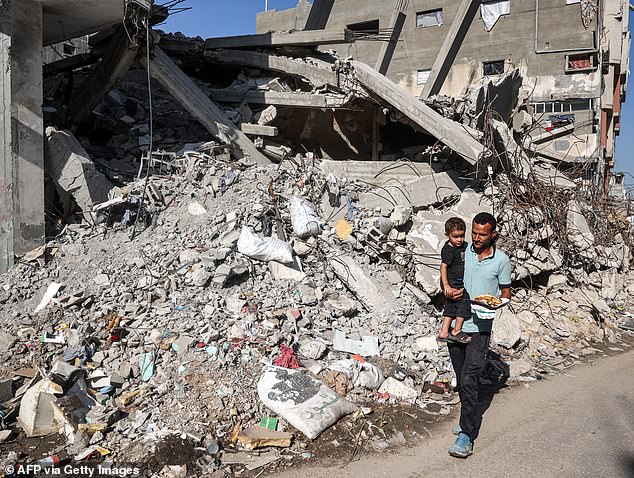
A man carries a child as he walks past a collapsed building in the Bureij camp for Palestinian refugees in the central Gaza Strip on October 9.
Sinwar had spent decades in an Israeli prison after being convicted in 1989 of kidnapping and executing two Israeli soldiers.
Known as the ‘Butcher of Khan Younis’ due to his zealous execution of Palestinians who had allegedly collaborated with Israel, Sinwar was released from prison as part of the 2011 Gilad Shalit prisoner exchange between Israel and Hamas.
Always considered a hardliner within Hamas, he is famous for his key role in founding Hamas’ military wing and security services, the Izz ad-Din al-Qassam and Majd brigades, which committed numerous terrorist attacks against Israelis. before October 7.
It comes as a Hamas head was seen in black and white footage, discovered by IDF troops during a raid earlier this year, which showed a man believed to be Sinwar making his way through a tunnel alongside with his wife and three children, while carrying a large bag.
‘In that bag there are about 25 kg of dynamite. There are at least 20 hostages around him,” according to Kobi Michael, Sinwar’s former Shin Bet interrogator.
“Some times we have had the opportunity to kill him, but if we do, he will kill all the hostages around him.”
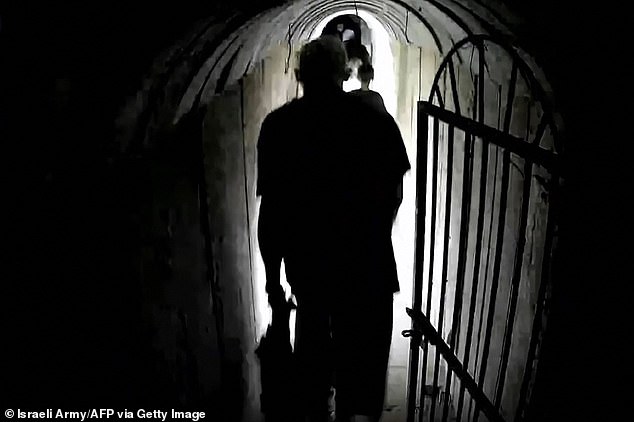
The black and white images (one of them pictured above), supposedly taken on October 10, show a man said to be Sinwar being led through a tunnel along with a woman and three children; They are said to be his first since the war between Israel and Hamas. burst
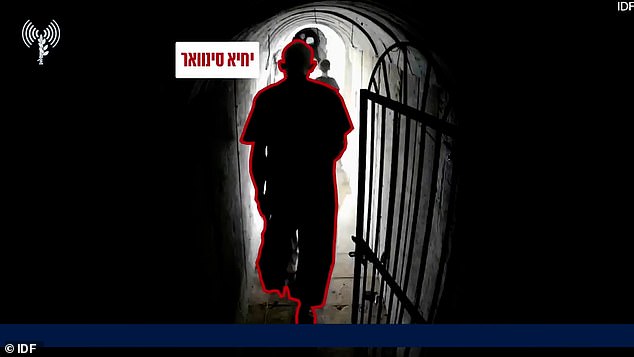
The IDF says the man circled in red above is Yahya Sinwar in images allegedly taken on October 10.

A man stands in front of a collapsed building in the Bureij camp for Palestinian refugees in the central Gaza Strip on October 9.
Some 97 hostages who were kidnapped on October 7, 2023 are believed to still be in Gaza a year later. It is not known how many have died in captivity.
In a year of retaliation for Hamas’ cross-border terrorist attack, relentless Israeli bombing of Gaza has killed more than 40,000 people, according to the Hamas-run Health Ministry.
Israel’s military said it had hit more than 40,000 targets, found 4,700 tunnels and destroyed 1,000 rocket launch sites during its year-long bombardment of the Strip.
Sinwar has no regrets about the Oct. 7 attacks, people in contact with him have said, despite unleashing an Israeli invasion that has killed tens of thousands of Palestinians, devastated his homeland and wreaked destruction on his ally Hezbollah.
The list of Hamas leaders killed in the following months includes Mohammed Deif, the head of the al-Qassam Brigades, Hamas’s military wing, who was killed in an airstrike in Gaza.
Saleh al-Arouri, founding commander of the al-Qassam Brigades, was killed in an explosion in Dahiyeh, a southern suburb of Beirut, which is a stronghold of Hezbollah, an ally of Hamas and part of Iran’s “Axis of Resistance.” .
Then in July, the leader of Hamas’s political wing, Ismail Haniyeh, was blown up, probably by Israel, while visiting Tehran to attend the inauguration of the Iranian president.


